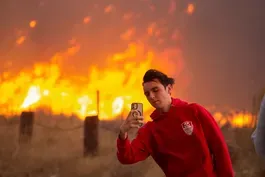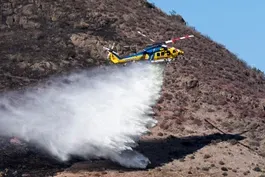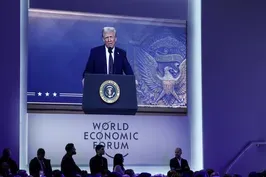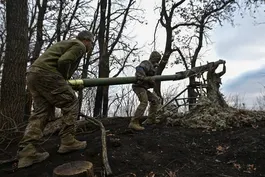
A look at destruction in Lebanon from Israeli airstrikes
Clip: 1/23/2025 | 6m 42sVideo has Closed Captions
A look at destruction in Lebanon from Israeli airstrikes and occupation of border region
On Sunday, the 60-day window to implement the ceasefire between Lebanon and Israel will close. As part of the deal, Israeli troops must withdraw from Lebanon and Hezbollah must disarm in a border zone. But just days from the deadline, Israeli troops remain and Hezbollah's status is unclear. Simona Foltyn reports from Beirut.
Major corporate funding for the PBS News Hour is provided by BDO, BNSF, Consumer Cellular, American Cruise Lines, and Raymond James. Funding for the PBS NewsHour Weekend is provided by...

A look at destruction in Lebanon from Israeli airstrikes
Clip: 1/23/2025 | 6m 42sVideo has Closed Captions
On Sunday, the 60-day window to implement the ceasefire between Lebanon and Israel will close. As part of the deal, Israeli troops must withdraw from Lebanon and Hezbollah must disarm in a border zone. But just days from the deadline, Israeli troops remain and Hezbollah's status is unclear. Simona Foltyn reports from Beirut.
How to Watch PBS News Hour
PBS News Hour is available to stream on pbs.org and the free PBS App, available on iPhone, Apple TV, Android TV, Android smartphones, Amazon Fire TV, Amazon Fire Tablet, Roku, Samsung Smart TV, and Vizio.
Providing Support for PBS.org
Learn Moreabout PBS online sponsorshipAMNA NAWAZ: On Sunday, the 60-day window to implement the cease-fire between Lebanon and Israel will close.
As part of the deal, Israeli troops must withdraw from Lebanon and Hezbollah must disarm in a border zone.
But just days from the deadline, Israeli troops remain and Hezbollah's status is unclear in a country that's faced widespread destruction in this latest war.
Simona Foltyn reports from Beirut.
SIMONA FOLTYN: Beirut's southern suburbs are once again in ruins.
After two months of Israeli bombardment, Dahiyeh's residents returned last November to find their homes, shops and lives reduced to rubble.
Husam's apartment block was still standing.
It narrowly escaped an Israeli strike that flattened several high-rise buildings, leaving hundreds of his neighbors homeless.
HUSAM MAZRAANI, Lebanon Resident (through translator): The tyrannical Israeli enemy is sowing lies that there Hezbollah fighters here, but there are only peaceful civilians.
They are destroying the environment that loves the resistance.
SIMONA FOLTYN: The IDF said it hit around 360 -- quote -- "terrorist structures" in Dahiyeh before the cease-fire went into effect on November 27.
These strikes decimated Hezbollah's top echelon, but they also killed scores of civilians and wreaked havoc on civilian infrastructure, which is forbidden under international law.
Dahiyeh is considered a Hezbollah stronghold, but it's also a sprawling suburb, home to around a million people, many of whom support the group.
There's a sense here that Israeli strikes did not just target Hezbollah's leadership and fighters, but also its Shia constituency.
Experts at the American University of Beirut are calling Israel's bombardment of Dahiyeh an urbicide the deliberate obliteration of urban fabric.
Professor Mona Fawaz is part of a team mapping the impact.
MONA FAWAZ, American University of Beirut: We're seeing massive destruction to civilian infrastructure.
That's very clear and certainly much broader than what we saw back in 2006.
SIMONA FOLTYN: During the 2006 war, Israel coined the so-called Dahiyeh Doctrine.
It's a military strategy involving the large-scale destruction of civilian infrastructure to pressure adversaries.
Back then, Israeli jets leveled around 250 multistory residential buildings clustered around the headquarters of Hezbollah.
According to satellite images analyzed by the "News Hour," the latest strikes appear to be scattered across a much wider area.
Fawaz said the goal wasn't just to degrade Hezbollah's military capabilities.
MONA FAWAZ: What we're seeing is also an effort to create a division, on the one hand, between Hezbollah and between the population, and, on the other, also between what's described as Hezbollah's supporters, the Shia community in Lebanon, and the rest of the population.
SIMONA FOLTYN: Israel says it's fighting Hezbollah, not civilians.
Back in September, Prime Minister Benjamin Netanyahu addressed the Lebanese people.
BENJAMIN NETANYAHU, Israeli Prime Minister: For too long, Hezbollah has been using you as human shields.
It placed rockets in your living rooms and missiles in your garage.
Please, get out of harm's way now.
Once our operation is finished, you can come back safely to your homes.
SIMONA FOLTYN: But in Lebanon's south there are barely any homes to return to.
This is what Israel and the State Department called a limited ground incursion.
Israel has razed entire border villages to the ground, and it continued long after the cease-fire went into effect.
This is, or, rather, was, Meiss El Jabal.
In November, the IDF blew up parts of the village.
The demolitions were captured in celebratory videos posted by Israeli soldiers.
From afar, the people of Meiss El Jabal watched in horror.
Zarifa, along with her husband, Moussa, and six children, fled the village last year.
Their house has been damaged, their daughter's bulldozed to the ground.
ZARIFA HAZIMA, Displaced (through translator): We were happy there.
I used to love to work in my garden, but they destroyed it.
What was in the house?
Nothing.
SIMONA FOLTYN: Just days before the deadline to withdraw, the IDF still occupies Lebanon's border towns and has forbidden residents to return.
But the "News Hour" has compared satellite images before and after the war to assess the level of destruction, focusing on these three areas.
This is the neighborhood near the hospital that was detonated by the IDF in early November.
Our analysis shows that 243 buildings have been destroyed, either completely, marked here in red, or partly, marked in pink.
In the village center, 249 buildings have been destroyed, including three mosques and a school.
MONA FAWAZ: The Israeli army tends to target first in villages the historic cores, monuments, buildings that are known to be - - to people, that bring people together.
SIMONA FOLTYN: The pattern is repeated in the adjacent village of Mhaibib, which has been almost completely wiped out.
Around 100 buildings were demolished in a controlled detonation, including an ancient shrine, a cemetery and a mosque.
Mhaibib's destruction was captured in this video.
The IDF says that large-scale demolitions have targeted Hezbollah's tunnel networks, but it has not provided compelling evidence.
Zarifa and Moussa refute the IDF's claims that Hezbollah embeds weapons in civilian homes.
MOUSSA KISHFI, Displaced (through translator): They're saying this so they can bomb people's houses.
They're trying to punish the civilians so they turn on Hezbollah.
ZARIFA HAZIMA (through translator): But they failed.
The more they hit the people, the more they support the resistance.
SIMONA FOLTYN: The fate of Meiss El Jabal is replicated along Lebanon's border with Israel.
Experts say that the objective is to create a depopulated buffer zone.
MONA FAWAZ: The bulldozers are actually bulldozing villages.
And they are actually booby-trapping people's homes, hospitals, public infrastructures.
And then they're basically broadcasting this to the world to see as a sign of their strength, their might.
And, sadly, this is weapons and funding that's coming from U.S. taxpayers.
SIMONA FOLTYN: With the deadline to implement the truce just days away and Hezbollah threatening to resume fighting if Israel doesn't withdraw, there's a risk of more fighting and destruction ahead.
For the "PBS News Hour," I'm Simona Foltyn in Beirut, Lebanon.
How global business leaders are responding to tariff threats
Video has Closed Captions
How global business leaders are responding to Trump's tariff threats (3m 16s)
Judge blocks Trump's order ending birthright citizenship
Video has Closed Captions
Federal judge puts blocks on Trump's order to end birthright citizenship (6m 30s)
Judges who oversaw cases frustrated by Jan. 6 pardons
Video has Closed Captions
After Jan. 6 pardons, judges who oversaw cases express frustrations (6m 52s)
Meet the team behind Watch Duty app giving wildfire updates
Video has Closed Captions
Meet the small team behind the Watch Duty app giving life-saving wildfire updates (5m 35s)
News Wrap: California crews battling new fires in LA area
Video has Closed Captions
News Wrap: California crews battling new fires in Los Angeles area (5m 26s)
The steps an Ohio county took to reduce infant mortality
Video has Closed Captions
The steps an Ohio county took to reduce infant mortality rates (8m 17s)
Trump lays out demands in reintroduction to world stage
Video has Closed Captions
Trump lays out demands in virtual reintroduction to world stage (4m 50s)
Trump willing to use economic pressure on Russia to end war
Video has Closed Captions
Trump says he's willing to use economic pressure on Russia to end Ukraine war (4m 3s)
Providing Support for PBS.org
Learn Moreabout PBS online sponsorshipMajor corporate funding for the PBS News Hour is provided by BDO, BNSF, Consumer Cellular, American Cruise Lines, and Raymond James. Funding for the PBS NewsHour Weekend is provided by...




















